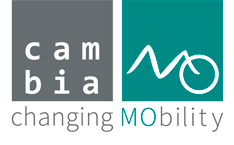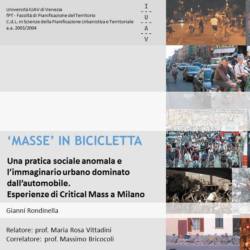‘Masse’ in bicicletta: una pratica sociale anomala e l’immaginario urbano dominato dall’automobile. Esperienze di Critical Mass a Milano
year
authors
type of publication
url reference
‘Masses’ on bicycle: an anomalous social practice and the urban imaginary dominated by the car. Critical Mass experiences in Milan
The car is part of the collective imaginary of the city. Its private use for urban travel is considered inevitable despite the heavy external costs and the devastating consequences of car-dependence on the environment, on the social fabric and on the very essence of the ‘urban’. Questioning on the reasons for the delay and incapacity of institutional initiatives to face the crisis of urban mobility, this study is based on the hypothesis that there is a “car paradigm”, of its ownership and its private use, and that this paradigm influences not only the mobility behavior of individuals but also the planning choices of institutions. It is therefore assumed that substantial changes in future urban mobility trends can occur only with a paradigm shift, that is, through the modification of a cultural assumption. Perceiving that this cannot be achieved only with the tools of planning, it is hypothesized that it may be a result of social practices that make visible alternatives never considered, stimulate new images of the city, promote the discussion of the entire civilization project, question possible futures and present new scenarios.
To investigate this possibility, the object of investigation is Critical Mass, considered in its general aspects of global urban movement and investigated in the specific case of Milan. Considered one of the most contagious and unsettling movements of recent decades, Critical Mass is a social practice that challenges the urban collective imaginary dominated by the automobile, giving the bicycle a role of potential transformation of urban life. It is a response to the crisis of urban mobility; an empirical, partial, self-organized and spectacular answer that affirms, embodying it, the right to walk the streets by bike ‘en masse’, to slow down traffic and inspire a more human use of the city; a social, political and cultural response that lies outside the institutional practices of planning, public policies and the usual forms of participation of civil society in collective life.
The thesis does not claim that only social practices such as Critical Mass favor that paradigm shift or that the policies and plans put in place in the areas of planning and government are useless. From the analysis of the effects of that “unsettling” social practice, however, a different way of looking at the city seems to emerge, of looking at the way one moves within it and, above all, a different looking at the way it is lived. All this triggers imaginaries and overall visions of the city that lead to small but daily actions, concrete, widespread locally and perhaps capable of triggering change.
Keywords: Urban mobility. Automobile culture. Collective imaginary. Social practices. Bicycle.
[language of text: Italian]
Rondinella, G. (2004). “Masse” in bicicletta: una pratica sociale anomala e l’immaginario urbano dominato dall’automobile. Esperienze di Critical Mass a Milano. Università Iuav di Venezia, Italy. Retrieved from https://sbd.iuav.it/Cataloghi/Cataloghi-dedicati/tesi/risultati.html&EW_T=M1&SOLOGET=1&NOPUNTOI=1&EW4_TBL=1&EW_FL=limits_te_fresh.php&EW4_DLL=50&EW4_NMI=1&EW4_CJL=1&EW_RM=50&EW_EP=(AU=RONDINELLA)&EW_RP=2&&EW_P=LS_EW&EW_D=TESI&EW=012749&
Other publications
Journal Article
Books
Conference Proceedings
Thesis
Book sections
Others

